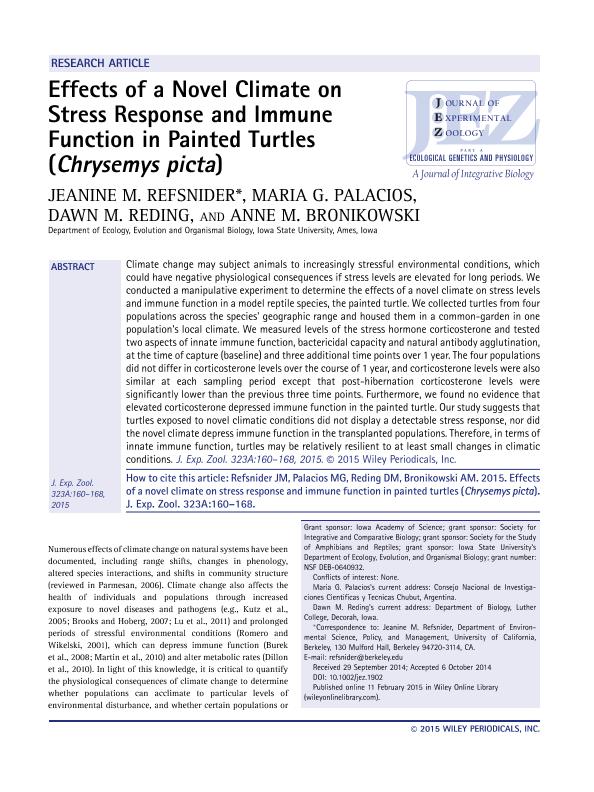Mostrar el registro sencillo del ítem
dc.contributor.author
Refsnider, Jeanine M.
dc.contributor.author
Palacios, María Gabriela

dc.contributor.author
Reding, Dawn M.
dc.contributor.author
Bronikowski, Anne M.
dc.date.available
2017-05-12T20:42:06Z
dc.date.issued
2015-03
dc.identifier.citation
Refsnider, Jeanine M.; Palacios, María Gabriela; Reding, Dawn M.; Bronikowski, Anne M.; Effects of a novel climate on stress response and immune function in painted turtles (Chrysemys picta); Wiley-liss, div John Wiley & Sons Inc.; Journal of Experimental Zoology Part A: Ecological Genetics and Physiology; 323; 3; 3-2015; 160-168
dc.identifier.issn
1932-5223
dc.identifier.uri
http://hdl.handle.net/11336/16421
dc.description.abstract
Climate change may subject animals to increasingly stressful environmental conditions, which could have negative physiological consequences if stress levels are elevated for long periods. We conducted a manipulative experiment to determine the effects of a novel climate on stress levels and immune function in a model reptile species, the painted turtle. We collected turtles from four populations across the species' geographic range and housed them in a common-garden in one population's local climate. We measured levels of the stress hormone corticosterone and tested two aspects of innate immune function, bactericidal capacity and natural antibody agglutination, at the time of capture (baseline) and three additional time points over 1 year. The four populations did not differ in corticosterone levels over the course of 1 year, and corticosterone levels were also similar at each sampling period except that post-hibernation corticosterone levels were significantly lower than the previous three time points. Furthermore, we found no evidence that elevated corticosterone depressed immune function in the painted turtle. Our study suggests that turtles exposed to novel climatic conditions did not display a detectable stress response, nor did the novel climate depress immune function in the transplanted populations. Therefore, in terms of innate immune function, turtles may be relatively resilient to at least small changes in climatic conditions.
dc.format
application/pdf
dc.language.iso
eng
dc.publisher
Wiley-liss, div John Wiley & Sons Inc.

dc.rights
info:eu-repo/semantics/openAccess
dc.rights.uri
https://creativecommons.org/licenses/by-nc-sa/2.5/ar/
dc.subject
Climate Change
dc.subject.classification
Conservación de la Biodiversidad

dc.subject.classification
Ciencias Biológicas

dc.subject.classification
CIENCIAS NATURALES Y EXACTAS

dc.title
Effects of a novel climate on stress response and immune function in painted turtles (Chrysemys picta)
dc.type
info:eu-repo/semantics/article
dc.type
info:ar-repo/semantics/artículo
dc.type
info:eu-repo/semantics/publishedVersion
dc.date.updated
2017-05-04T17:08:03Z
dc.identifier.eissn
1932-5231
dc.journal.volume
323
dc.journal.number
3
dc.journal.pagination
160-168
dc.journal.pais
Estados Unidos

dc.journal.ciudad
New York
dc.description.fil
Fil: Refsnider, Jeanine M.. University Of California Berkeley; Estados Unidos
dc.description.fil
Fil: Palacios, María Gabriela. Consejo Nacional de Investigaciones Científicas y Técnicas. Centro Científico Tecnológico Conicet - Centro Nacional Patagónico.; Argentina
dc.description.fil
Fil: Reding, Dawn M.. Luther College. Department of Biology; Estados Unidos
dc.description.fil
Fil: Bronikowski, Anne M.. Iowa State University. Department of Ecology, Evolution and Organismal Biology.; Estados Unidos
dc.journal.title
Journal of Experimental Zoology Part A: Ecological Genetics and Physiology

dc.relation.alternativeid
info:eu-repo/semantics/altIdentifier/doi/http://dx.doi.org/10.1002/jez.1902
dc.relation.alternativeid
info:eu-repo/semantics/altIdentifier/url/http://onlinelibrary.wiley.com/doi/10.1002/jez.1902/abstract
Archivos asociados
